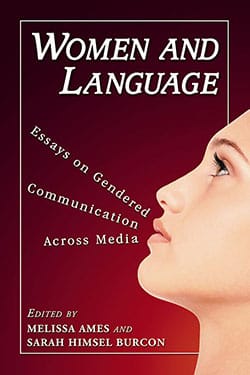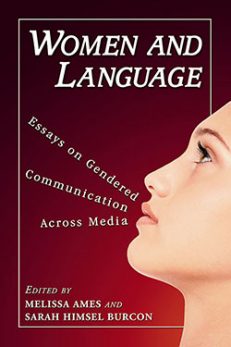Women and Language
Essays on Gendered Communication Across Media
Original price was: $29.95.$14.99Current price is: $14.99.
In stock
About the Book
The present volume of essays examines women’s communication as it has evolved historically across multiple mediums. Part I explores how women became “gossip girls” and the important role of gossip in the perception and practice of female communication. Essays in Part II cover the convergence of oral and written communication in women’s literature. Gendered performance in such arenas as salsa dance, Dr. Phil and the Internet is examined in Part III, and essays in Part IV discuss women’s communication in the technology-rich 21st century.
About the Author(s)
Bibliographic Details
Edited by Melissa Ames and Sarah Himsel Burcon
Format: softcover (6 x 9)
Pages: 244
Bibliographic Info: notes, bibliographies, index
Copyright Date: 2011
pISBN: 978-0-7864-4944-6
eISBN: 978-0-7864-8621-2
Imprint: McFarland
Table of Contents
INTRODUCTION: WOMEN AND ORAL CULTURE 1
Melissa Ames and Sarah Himsel Burcon
PART I. SPOKEN SPACES: THE HISTORICIZATION, EVOLUTION, AND GENDERING OF “GOSSIP”
1. Pandora’s Voice-Box: How Woman Became the “Gossip Girl” 17
Giselle Bastin
2. Just Like a Woman: Misogynistic Gossip in the Correspondence Between John Chamberlain and Sir Dudley Carleton 30
Emily Ross
3. “Paper cannot blush”: Martha Fowke, an 18th-Century Abandoned Woman 45
Earla Wilputte
PART II. LITERARY SPACES: THE CONVERGENCE OF ORALITY AND PRINT IN WOMEN’S WRITING
4. Delete as Appropriate: Writing Between the Lines of Female Orality in The Wife’s Lament 61
Miriam Muth
5. Voicing the Feminine and the (Absent) Masculine in The Concealed Fancies 75
Lindsay Yakimyshyn
6. The Wartime Diaries of Dang Thuy Tram: Extolling and Gendering the Heroine’s Voice in Postwar Vietnam and Beyond 90
Hanh N. Nguyen and R. C. Lutz
7. When Talk Meets Page: The Feminist Aesthetic of Adapted Narration and Language Play 104
Melissa Ames
8. Blurred Boundaries and Re-Told Histories: Julia Alvarez’s How the García Girls Lost Their Accents 119
Sarah Himsel Burcon
PART III. PERFORMATIVE SPACES: CONSTRUCTING AND INSTRUCTING GENDERED BEHAVIOR
9. Bodies in Dialogue: Performing Gender and Sexuality in Salsa Dance 137
Aleysia Whitmore
10. “Tell me, does she talk during sex?” The Gendering of Permissible Speech on Dr. Phil 151
Diana York Blaine
11. Read My Profile: Internet Profile Culture, Young Women, and the Communication of Power 167
Ashley M. Donnelly
PART IV. TECHNOLOGICAL SPACES: TRANSFORMING “TALK” IN THE 21ST CENTURY
12. Women, Kin-Keeping, and the Inscription of Gender in Mediated Communication Environments 185
Julie Dare
13. Gendering the Construction of Instant Messaging 199
Koen Leurs and Sandra Ponzanesi
14. Gender Blogging: Femininity and Communication Practices on the Internet 215
Adriana Braga
ABOUT THE CONTRIBUTORS 229
Index 233






